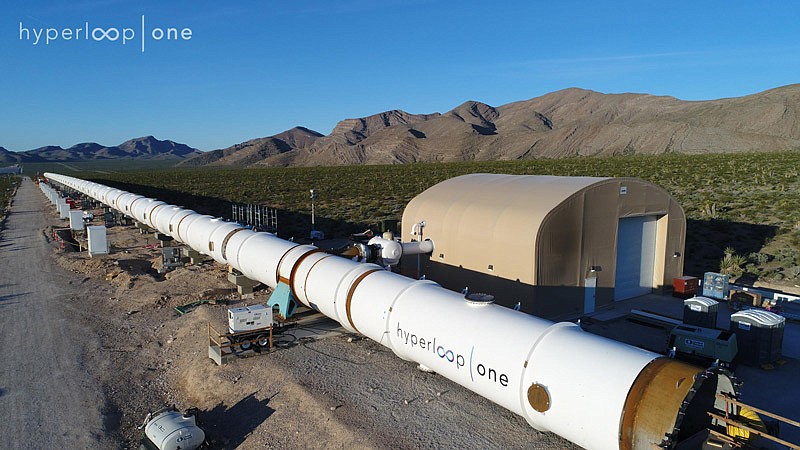Lt. Gov. Mike Kehoe will head a new "Blue Ribbon Panel on Hyperloop" that's been formed to study the feasibility of building an ultra high-speed connection along Interstate 70, between St. Louis and Kansas City, with a stop in Columbia.
"I think anybody in this room knows that the word 'infrastructure' has probably come out of my mouth (about) 8,000 times in the last several years," Kehoe told reporters during a Capitol news conference. "But the words you haven't, probably, heard me use too many times are, 'What's next?'
"I think Missouri is in a fantastic position. We're a state that has the ingenuity, technology (and) resources to look at what's next in the future (and) if there are possibilities as we go forward."
House Speaker Elijah Haahr announced the creation of the special committee Tuesday morning.
"This is something I've been very excited about for a period of time," Haahr, R-Springfield, told reporters. "Rep. (Travis) Fitzwater - who will be on the panel - and I went to Nevada last year to look at the initial test track that Virgin One has in the Mojave Desert. (I was) very impressed with the technology."
Haahr noted Missouri is "early in the process but ahead of the game when it comes to this issue. The other states that have at least considered this option are significantly behind where we're at, at this point."
Fitzwater told the News Tribune on Tuesday evening: "I think we're farther along than people realize (with Hyperloop) as a feasible transportation project."
He said forming the Blue Ribbon committee doesn't mean the state is "rushing into anything," and he acknowledged Missouri also must "take care of our current infrastructure problems."
But, after seeing the work in Nevada last year, he said, he understands "These technologies are a lot closer" to becoming reality than many people think - and it would be to Missouri's advantage to be in the forefront of the new technology.
Kehoe said some Missouri universities - especially the University of Missouri-Columbia - are "very excited about the opportunity to be able to participate in the research piece of what this technology is all about."
The lieutenant governor noted Missouri's been involved in a number of "firsts" in U.S. transportation history, including being the first state that funded Charles Lindbergh's flight to France, building the Eads Bridge across the Mississippi River and having engineers that helped put men on the moon.
"So," he said, "we're a state that has the ingenuity, technology and resources" to "look at what's next in the future."
Options include building the project above ground or below ground, or some combination of the two ideas.
Andrew Smith, of the St. Louis Regional Chamber of Commerce, will be the committee's vice chairman.
"This is a project that, I think, has tremendous economic development implications for the state," he said. "Imagine being able to travel between Kansas City and St. Louis in 28 minutes."
Hyperloop is one of several technologies being studied by corporations and researchers. It generally involves a tube-like track to carry a passenger- (or cargo-) filled container at speeds of more than 600 mph.
Another growing technology is high-speed rail, but Haahr said "high speed rail is about one-third as fast and costs more than the Hyperloop" - although he also said it's too early to place a price tag on building a Hyperloop connection between Kansas City and St. Louis.
He added: "If you look at what our transportation will look like in a hundred years, I think Hyperloop has much more of a far-reaching promise than high-speed rail does.
"A hundred years ago, Missouri was the 'Gateway to the West.' We started the interstate system here, (and now) we want to be the 'Gateway to the World' and start the Hyperloop here."
Black & Veatch, a global engineering company, already has done a study on the Hyperloop idea.
Clinton Robinson, a Black & Veatch associate vice president and director of state and local government affairs, also is a member of the new task force.
He said in a news release: "Our first-of-its-kind feasibility study demonstrated Hyperloop can work in Missouri."
The state of California has had to scale back its high-speed rail plans between Los Angeles and San Francisco because of ballooning costs.
Haahr said the Blue Ribbon panel must "figure out the (financial) feasibility of this," as well as looking at "a variety of factors" to determine possible funding sources for a project.
Outside of test projects like the one in Nevada, no working Hyperloop project exists.
Haahr said: "We have to have one that gets built first. If we are able to build this and if it becomes successful, you can go anywhere (in the country) from here."
Kehoe said the committee still is being formed, with several private industry representatives still to be named.
Committee members announced Tuesday include Kehoe, Fitzwater, Smith, Robinson, Rep. Derek Grier, R-Chesterfield, Sen. Caleb Rowden, R-Columbia, Sen. Tony Luetkemeyer, R-St. Joseph, Sen. Brian Williams, D-University City, Economic Development Director Rob Dixon and University of Missouri System President Mun Choi.
With only one Democrat named so far, Haahr said the lack of bipartisan membership isn't a big deal.
"I don't think anything about moving transportation forward as a partisan issue," Haahr said. "I think it's a bipartisan issue."
The panel is charged with reporting its findings by this fall.
Kehoe said the first meeting likely will be later this month, with follow-up hearings in Kansas City, St. Louis and Columbia.

